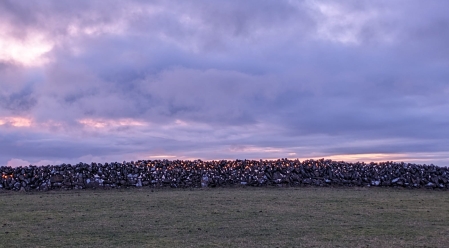I could mend nets. Thatch a roof. Build stairs. Make a basket from reeds. Splint the leg of a cow. Cut turf. Build a wall. Go three rounds with Joe in the ring Da put up in the barn. I could dance sets. Read the sky. Make a barrel for mackerel. Mend roads. Make a boat. Stuff a saddle. Put a wheel on a cart. Strike a deal. Make a field. Work the swarth turner, the float and the thresher. I could read the sea. Shoot straight. Make a shoe. Shear sheep. Remember poems. Set potatoes. Plough and harrow. Read the wind. Tend bees. Bind wyndes. Make a coffin. Take a drink. I could frighten you with stories. I knew the song to sing to a cow when milking. I could play twenty-seven tunes on my accordion.
That's the entirety of Chapter 9 in I could read the sky [1997] by Timothy O'Grady (words) and Steve Pyke (pics) A list less fighty than, say, Heinlein's . . . except the boxing; more handy than Anne Fadiman's [bothoprev]. The respectful Forward is by John Berger - of course given this book's words+pics country-life homage to his A Fortunate Man. Here's a 20m retrospective on RTE from earlier this year.
The book is written as a memory palace of an ould feller who escaped from the West of Ireland when he was vigorous to seek his fortune in England; but he can't stop cycling the rolladex images of his youth. He works as a labourer ; recreates in the boozer ; plays a mean accordion ; gets married ; is widowed ; dies in a bedsit in London. Along the way several of his friends-and-relations die violently because health & safety was sketchy among McAlpine's Fusiliers. When he was born, his little community was self-sufficient and introspective. By the time he comes home to be buried, half the houses in the townland are roofless and abandoned: the families who lived there scattered or dead.
The tale is not 'true' and it's a little happier than the many tales of the lonely Irish diasporans with no kin to claim their body. The London Irish Centre runs a befriending service for the lonely ex-pats. The photos in the book are not 'true' either, in that they are a pastiche rather than documenting a specific community at home and in Britland. But as the quote at the top recognises, a life lived without the trappings of 'success' is not necessarily unhappy or unfulfilled.

No comments:
Post a Comment